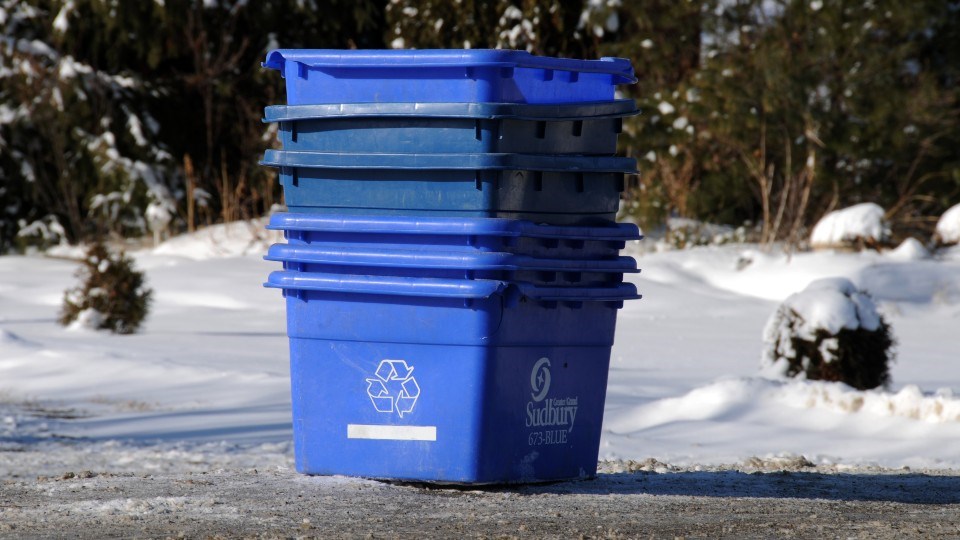Although the province is shifting municipalities away from financial responsibility for recycling, Greater Sudbury is poised to maintain its involvement to help fill a projected gap in services.
The change, which is taking effect throughout the province by 2026, will have the producers of recyclable materials pay for the curbside collection and processing of recyclables.
That is, except for recyclable materials that come from the industrial, commercial and institutional-sector (ICI) sources, which have been left out of the residential-exclusive equation.
During last week’s operations committee meeting, the city was asked to proceed with a plan to have the City of Greater Sudbury continue to fill this gap in service even after they transition away from handling blue box services by April 2025.
“It shouldn’t matter where the material was generated,” city director of environmental services Renee Brownlee said, adding that the province’s move to exclude non-residential recyclables should be called to question.
Under this scenario, drinking a can of pop at a restaurant and disposing of it there will not have the can’s recycling covered by the producer-pay system. Taking the pop can home and disposing of it there, however, would be covered.
Although the non-residential sectors aren’t covered by the current system either, Brownlee said “it’s definitely something that Greater Sudbury, as well as our peer municipalities, are continuing to push forward and lobby the province to do, is to include all sources of recyclable material under full producer responsibility.”
During an operations committee meeting earlier this week, city manager of growth and infrastructure Tony Cecutti said that the Association of Municipalities of Ontario and the Federation of Canadian Municipalities are also included in this ongoing advocacy effort.
The provincially mandated transition from a municipally based recycling program to one entirely paid for by the producers of recyclable products is being implemented in a staggered schedule between April 2023 and December 2025, with Greater Sudbury scheduled for April 2025.
Under current legislation, municipalities are required to operate blue box recycling programs and the producers of blue box materials are responsible for providing municipalities with up to 50 per cent of funding for the management of their products collected from residential properties. Similar to the new system taking over in 2025, there is no funding for non-residential blue box materials.
The city currently fills the gap and accepts non-residential material at their recycling facility on Frobisher Street, which contributed 6.8-million kilograms of material in 2019 while residential pickup contributed 12-million kilograms.
In the shift toward full producer responsibility for recycling by April 2025, the city faces the option of either divesting of their recycling facility – the only such facility in Greater Sudbury – or leasing it to contractors bidding for its operations.
This leasing option, Brownlee said, would allow the city to piggyback on the operation to continue funding the processing of ICI-sector materials.
This effort combined with the residential recycling would create the critical mass required to make the facility’s operations financially viable for the operator.
“Leasing the blue box processing facility creates the least risk and provides the best opportunity to achieve waste diversion goals,” she said during this week’s meeting.
This is the option the committee asked the city to proceed with as a means of reducing the amount of waste that reaches the city’s landfill and help meet the city’s goal of diverting 90 per cent of waste from the landfill site by 2050. This option is expected to cost the city approximately $700,000 per year, though this amount may be reduced by rental income and fees charged to ICI-sector contributors.
Option 2 would have seen the city continuing with the processing of ICI-sector materials only at the facility, which a municipal report cautions as not carrying a great enough volume without residential material to make the operation profitable for the contractor.
Option 3 would have been discontinuing the blue box processing operation, which would push the ICI sector to haul their recyclables long distance, which may prove more costly than paying landfill fees.
This would require the city to fund additional monitoring and inspection of loads at landfill sites at a cost of approximately $250,000 to ensure people are paying the $270/tonne tipping fee for loads mixed with blue box recyclables instead of the standard $90/tonne fee.
Doing away with ICI recycling would save the city approximately $500,000 per year in processing fees, which would be cut in half by the additional monitoring and inspection costs and further chipped away at by the long-term implications of filling up the city’s landfill site more quickly in contradiction to the city’s Community Energy and Emissions Plan goals.
Tyler Clarke covers city hall and political affairs for Sudbury.com.
